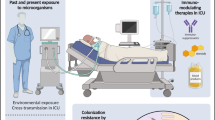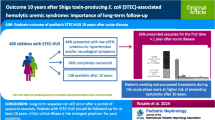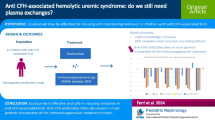Abstract
Purpose
To identify reversible risk factors for Clostridium difficile infection (CDI) after kidney transplantation (KT) that could lead to a reduction in its incidence and associated complications.
Methods
We performed a single-center case–control study in which 41 patients undergoing KT between February 2009 and July 2013 who developed a first episode of post-transplant CDI were included as cases. Patients transplanted at the same calendar day (±2 weeks) as each case with no evidence of CDI and comparable risk exposure period were chosen as controls (2:1 ratio). Serum immunoglobulin and complement levels were systematically measured at baseline and months 1 and 6 after transplantation.
Results
Multivariate regression analysis identified age-adjusted Charlson comorbidity index (odds ratio [OR] per unitary increment 1.31; P value = 0.043), delayed graft function (OR 2.76; P value = 0.039), prior cytomegalovirus (CMV) disease (OR 6.85; P value = 0.011) and prior acute graft rejection (OR 5.92; P value = 0.008) as risk factors for post-transplant CDI. Cases with their first episode of CDI occurring beyond the first month were more likely to have IgG hypogammaglobulinemia (HGG) at month 1 (P value = 0.002), whereas cases with CDI beyond the sixth month were more likely to have HGG of any class at month 6 (P value = 0.003). Poor outcome (graft loss and/or all-cause mortality) was more common among cases (adjusted hazard ratio 5.69; P value = 0.001).
Conclusion
The occurrence of CDI exerts a detrimental effect on graft and patient outcome. Post-transplant HGG was a potentially modifiable risk factor for CDI in KT recipients.


Similar content being viewed by others
References
Lessa FC, Gould CV, McDonald LC. Current status of Clostridium difficile infection epidemiology. Clin Infect Dis. 2012;55(Suppl 2):S65–70.
Linsky A, Gupta K, Lawler EV, Fonda JR, Hermos JA. Proton pump inhibitors and risk for recurrent Clostridium difficile infection. Arch Intern Med. 2010;170:772–8.
Loo VG, Bourgault AM, Poirier L, Lamothe F, Michaud S, Turgeon N, et al. Host and pathogen factors for Clostridium difficile infection and colonization. N Engl J Med. 2011;365:1693–703.
Al-Tureihi FI, Hassoun A, Wolf-Klein G, Isenberg H. Albumin, length of stay, and proton pump inhibitors: key factors in Clostridium difficile-associated disease in nursing home patients. J Am Med Dir Assoc. 2005;6:105–8.
Dubberke ER, Reske KA, Yan Y, Olsen MA, McDonald LC, Fraser VJ. Clostridium difficile-associated disease in a setting of endemicity: identification of novel risk factors. Clin Infect Dis. 2007;45:1543–9.
Riddle DJ, Dubberke ER. Clostridium difficile infection in solid organ transplant recipients. Curr Opin Organ Transpl. 2008;13:592–600.
Gellad ZF, Alexander BD, Liu JK, Griffith BC, Meyer AM, Johnson JL, et al. Severity of Clostridium difficile-associated diarrhea in solid organ transplant patients. Transpl Infect Dis. 2007;9:276–80.
Stelzmueller I, Goegele H, Biebl M, Wiesmayr S, Berger N, Tabarelli W, et al. Clostridium difficile colitis in solid organ transplantation: a single-center experience. Dig Dis Sci. 2007;52:3231–6.
Len O, Rodríguez-Pardo D, Gavaldà J, Aguado JM, Blanes M, Borrell N, et al. Outcome of Clostridium difficile-associated disease in solid organ transplant recipients: a prospective and multicentre cohort study. Transpl Int. 2012;25:1275–81.
Boutros M, Al-Shaibi M, Chan G, Cantarovich M, Rahme E, Paraskevas S, et al. Clostridium difficile colitis: increasing incidence, risk factors, and outcomes in solid organ transplant recipients. Transplantation. 2012;93:1051–7.
Neofytos D, Kobayashi K, Alonso CD, Cady-Reh J, Lepley D, Harris M, et al. Epidemiology, risk factors, and outcomes of Clostridium difficile infection in kidney transplant recipients. Transpl Infect Dis. 2013;15:134–41.
Lee JT, Kelly RF, Hertz MI, Dunitz JM, Shumway SJ. Clostridium difficile infection increases mortality risk in lung transplant recipients. J Heart Lung Transplant. 2013;32:1020–6.
Dallal RM, Harbrecht BG, Boujoukas AJ, Sirio CA, Farkas LM, Lee KK, et al. Fulminant Clostridium difficile: an underappreciated and increasing cause of death and complications. Ann Surg. 2002;235:363–72.
Pant C, Anderson MP, O’Connor JA, Marshall CM, Deshpande A, Sferra TJ. Association of Clostridium difficile infection with outcomes of hospitalized solid organ transplant recipients: results from the 2009 Nationwide Inpatient Sample database. Transpl Infect Dis. 2012;14:540–7.
Hsu JL, Enser JJ, McKown T, Leverson GE, Pirsch JD, Hess TM, et al. Outcomes of Clostridium difficile infection in recipients of solid abdominal organ transplants. Clin Transplant. 2014;28:267–73.
Albright JB, Bonatti H, Mendez J, Kramer D, Stauffer J, Hinder R, et al. Early and late onset Clostridium difficile-associated colitis following liver transplantation. Transpl Int. 2007;20:856–66.
Fernández-Ruiz M, López-Medrano F, Varela-Peña P, Lora-Pablos D, García-Reyne A, González E, et al. Monitoring of immunoglobulin levels identifies kidney transplant recipients at high risk of infection. Am J Transpl. 2012;12:2763–73.
Fernández-Ruiz M, López-Medrano F, Varela-Peña P, Morales JM, García-Reyne A, San Juan R, et al. Hypocomplementemia in kidney transplant recipients: impact on the risk of infectious complications. Am J Transpl. 2013;13:685–94.
Muñoz P, Giannella M, Alcalá L, Sarmiento E, Fernandez Yañez J, Palomo J, et al. Clostridium difficile-associated diarrhea in heart transplant recipients: is hypogammaglobulinemia the answer? J Heart Lung Transpl. 2007;26:907–14.
Carbone J, Sarmiento E, Del Pozo N, Rodriguez-Molina JJ, Navarro J, Fernandez-Yañez J, et al. Restoration of humoral immunity after intravenous immunoglobulin replacement therapy in heart recipients with post-transplant antibody deficiency and severe infections. Clin Transpl. 2012;26:E277–83.
Rodríguez-Pardo D, Almirante B, Bartolomé RM, Pomar V, Mirelis B, Navarro F, et al. Epidemiology of Clostridium difficile infection and risk factors for unfavorable clinical outcomes: results of a hospital-based study in Barcelona. Spain. J Clin Microbiol. 2013;51:1465–73.
Orellana-Miguel MA, Alcolea-Medina A, Barrado-Blanco L, Rodríguez-Otero J, Chaves-Sánchez F. Algorithm proposal based on the C. Diff Quik Chek Complete ICT device for detecting Clostridium difficile infection. Enferm Infecc Microbiol Clin. 2013;31:97–9.
Barbut F, Surgers L, Eckert C, Visseaux B, Cuingnet M, Mesquita C, et al. Does a rapid diagnosis of Clostridium difficile infection impact on quality of patient management? Clin Microbiol Infect. 2014;20:136–44.
Charlson ME, Pompei P, Ales KL, MacKenzie CR. A new method of classifying prognostic comorbidity in longitudinal studies: development and validation. J Chronic Dis. 1987;40:373–83.
Bauer MP, Kuijper EJ, van Dissel JT. European society of clinical microbiology and infectious diseases. European society of clinical microbiology and infectious diseases (ESCMID): treatment guidance document for Clostridium difficile infection (CDI). Clin Microbiol Infect. 2009;15:1067–79.
Dubberke ER, Burdette SD. AST infectious diseases community of practice. Clostridium difficile infections in solid organ transplantation. Am J Transpl. 2013;13(Suppl 4):42–9.
European Expert Group on Renal Transplantation (EBPG). European Renal Association (ERA-EDTA); European Society for Organ Transplantation (ESOT). European best practice guidelines for renal transplantation (part 1. Nephrol Dial Transpl. 2000;15(Suppl 7):1–85.
Ljungman P, Griffiths P, Paya C. Definitions of Cytomegalovirus infection and disease in transplant recipients. Clin Infect Dis. 2002;34:1094–7.
Florescu DF, Kalil AC, Qiu F, Schmidt CM, Sandkovsky U. What is the impact of hypogammaglobulinemia on the rate of infections and survival in solid organ transplantation? A meta-analysis. Am J Transpl. 2013;13:2601–10.
Kyne L, Warny M, Qamar A, Kelly CP. Asymptomatic carriage of Clostridium difficile and serum levels of IgG antibody against toxin A. N Engl J Med. 2000;342:390–7.
Kyne L, Warny M, Qamar A, Kelly CP. Association between antibody response to toxin A and protection against recurrent Clostridium difficile diarrhoea. Lancet. 2001;357:189–93.
McPherson S, Rees CJ, Ellis R, Soo S, Panter SJ. Intravenous immunoglobulin for the treatment of severe, refractory, and recurrent Clostridium difficile diarrhea. Dis Colon Rectum. 2006;49:640–5.
Lowy I, Molrine DC, Leav BA, Blair BM, Baxter R, Gerding DN, et al. Treatment with monoclonal antibodies against Clostridium difficile toxins. N Engl J Med. 2010;362:197–205.
Alonso CD, Dufresne SF, Hanna DB, Labbé AC, Treadway SB, Neofytos D, et al. Clostridium difficile infection after adult autologous stem cell transplantation: a multicenter study of epidemiology and risk factors. Biol Blood Marrow Transpl. 2013;19:1502–8.
Florescu DF, Mindru C, Chambers HE, Kalil AC. Clostridium difficile and cytomegalovirus colitis co-infection: search for the hidden ‘bug’. Transpl Infect Dis. 2011;13:411–5.
Chakrabarti S, Lees A, Jones SG, Milligan DW. Clostridium difficile infection in allogeneic stem cell transplant recipients is associated with severe graft-versus-host disease and non-relapse mortality. Bone Marrow Transpl. 2000;26:871–6.
Hashimoto M, Sugawara Y, Tamura S, Kaneko J, Matsui Y, Togashi J, et al. Clostridium difficile-associated diarrhea after living donor liver transplantation. World J Gastroenterol. 2007;13:2072–6.
Shah SA, Tsapepas DS, Kubin CJ, Martin ST, Mohan S, Ratner LE, et al. Risk factors associated with Clostridium difficile infection after kidney and pancreas transplantation. Transpl Infect Dis. 2013;15:502–9.
Keven K, Basu A, Re L, Tan H, Marcos A, Fung JJ, et al. Clostridium difficile colitis in patients after kidney and pancreas-kidney transplantation. Transpl Infect Dis. 2004;6:10–4.
Razonable RR, Rivero A, Rodriguez A, Wilson J, Daniels J, Jenkins G, et al. Allograft rejection predicts the occurrence of late-onset cytomegalovirus (CMV) disease among CMV-mismatched solid organ transplant patients receiving prophylaxis with oral ganciclovir. J Infect Dis. 2001;184:1461–4.
Freeman RB Jr. The ‘indirect’ effects of cytomegalovirus infection. Am J Transplant. 2009;9:2453–8.
Acknowledgments
The present study was partially supported by the Spanish Ministry of Economy and Competitiveness (Fondo de Investigaciones Sanitarias [FIS] project PI 11/01538) and the Fundación Mutua Madrileña de Investigación Médica (FMM Grant 2010/0015). Julia Origüen holds a research-training contract “Rio Hortega” (CM13/00180) from the Spanish Ministry of Economy and Competitiveness (Instituto de Salud Carlos III).
Conflicts of interest
Julia Origüen has received an unrestricted research grant from Astellas Pharma España. All other authors: none to declare.
Author information
Authors and Affiliations
Corresponding author
Electronic supplementary material
Below is the link to the electronic supplementary material.
Rights and permissions
About this article
Cite this article
Origüen, J., Fernández-Ruiz, M., Lumbreras, C. et al. Potential role of post-transplant hypogammaglobulinemia in the risk of Clostridium difficile infection after kidney transplantation: a case–control study. Infection 43, 413–422 (2015). https://doi.org/10.1007/s15010-015-0737-2
Received:
Accepted:
Published:
Issue Date:
DOI: https://doi.org/10.1007/s15010-015-0737-2




